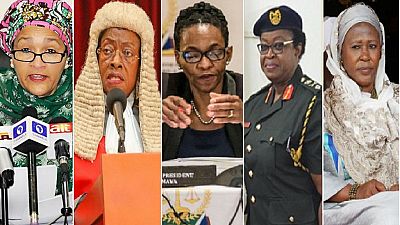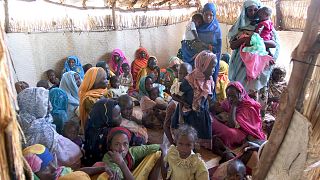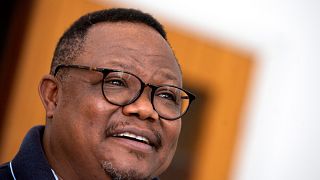Africa
2017 was a good year for African women as a number of them rose up the ladder in their fields be it in politics, diplomacy, the military and the judiciary.
Despite crossing over into 2018, Africanews continues our look back at 2017 as part of our 2017 Review.
Nigeria’s Amina Mohammed takes oath of office as deputy UNSG
It started off with the swearing in of Amina Mohammed as deputy United Nations Secretary-General in February 2017. Her appointment was announced late 2016 at a time she was Nigeria’s environment minister.
Amina became only the second African woman to be appointed to the role of Deputy Secretary-General of the UN. The first being Tanzania’s Asha-Rose Migiro who served in the role between 2007 – 2012 under Ban Ki-moon.
Read also: Nigeria’s Amina Mohammed takes office as Deputy UNSG
Gambia double: First female speaker of parliament, visually impaired lawmaker
The Gambia managed with the help of ECOWAS to scale the Yahya Jammeh political hurdle in January 2017. Jammeh is currently living in exile in Equatorial Guinea. President Adama Barrow was subsequently sworn into office.
In April 2017, the country’s new parliament was constituted after local polls which the ruling coalition dominated. The country picked its first female speaker of parliament in the person of Mariama Diack Denton.
“I will do my best to live up to expectation. I will be impartial as expected and maintain the dignity of the office. I look forward to working with all sides of the Assembly and ensure that the welfare of the people is the priority,” she said after taking her oath of office.
Still in April, there was the appointment of Gambia’s first visually impaired female member of parliament. Ndey Yassin Secka-Sallah was appointed by the President as one of five nominees he can nominate to parliament as per the constitution.
Read: The visually impaired broadcaster serving as Gambian lawmaker
After the initial back and forth over her age limit, Gambian president Adama Barrow kept Fatoumata Jallow Tambajang as acting vice and women’s affairs minister until the legal hurdles were addressed.
She formally took office as vive-president in November 2017. She had played a key role in the formation of the coalition that ousted Yahya Jammeh after 22 years.
Congratulations to #Gambia new V.P Mrs. Fatoumata Jallow-Tambajang, a woman with wealth of experience highly required for rebuilding #NewGambia. pic.twitter.com/wIyquZJXz9
— President Barrow (@BarrowPresident) November 9, 2017
Read more about Africa’s female vice-presidents: Zambia, The Gambia and Tanzania
South Africa president appoints woman to head second highest court
In May 2017, South Africa’s President Jacob Zuma appointed Justice Mandisa Maya as the President of the Supreme Court of Appeal, the president’s office said, making her the first woman to occupy the position.
“Her appointment to the position elevates her to the third highest position in the Judicial Branch, after the Chief Justice and Deputy Chief Justice of the Republic,” Zuma said at the time. The court is the second highest judicial body in South Africa.
Ghana picks second woman Chief Justice to replace retired pioneer
Ghana said goodbye to a female trailblazer in its judicial history as Georgina Theodora Wood retired as Chief Justice after a decade in charge. President Nana Addo Dankwa Akufo-Addo went on to pick another woman to hold the fourth most important office in the country.
Justice Sophia Akuffo was in June this year sworn into office. She is the second female CJ in Ghana’s history but the fifth under its current 1992 consitution. She can serve as president in the absence of the president, his vice and the speaker of parliament.
Ghana’s second straight woman chief judge: Justice Sophia Akuffo
Ghana gets first female Brigadier – General
Still in Ghana, the west African country got its first female Brigadier-General in the person of Constance Ama Emefa Edjeani-Afenu.
Her appointment to the post was ratified in March 2017 when the Chief of Defence Staff (CDS) Major – General Obed Boamah Akwa, conferred the rank on her during a ceremony in the capital Accra.
After serving in different capacities since joining the Ghana Armed Forces in 1978, she served as Ghana’s deputy military advisor to its permanent mission in New York since 2013. With her new position, she returns to take up post at the Ministry of Defence in Accra.
Salute to Ghana’s first female Brigadier – General
Nigeria’s north gets its first female Commodore
In December 2017, Nigeria also celebrated Captain Jamila Malafa for becoming the first woman from the country’s north to rise to the rank of a Commodore.
The post of a Commodore is equivalent to that of a Brigadier General in the army. A commodore is a commissioned naval officer who ranks above a captain and below a rear admiral; the lowest grade of admiral.
The 55-year-old who hails form the northeastern Adamawa State was decorated at an event in the capital Abuja.
Cameroon’s Vera Songwe beats off competition to get ECA post
In April last year, Cameroonian economist and banking executive Vera Songwe was appointed the new Executive Secretary of the Economic Commission on Africa (ECA).
Dr. Songwe beat more than 70 candidates to clinch the post which was held by Dr. Carlos Lopes who stepped down from the organisation in September 2016.
ECA is one of the United Nation’s five regional commissions, and its mandate is to promote the economic and social development of African states.
History is made as Egypt gets its first female governor
Egypt has a total of twenty-seven governorates. Governorates are the top tier of the country’s jurisdiction hierarchy. A governorate is administered by a governor, who is appointed by the President of Egypt and serves at the president’s discretion.
But it was not until February 2017 that Egypt got its first female governor in Nadia Ahmed Abdou Saleh. The most populous north African country had never before elected a woman to serve as governor. The furthest women got politically was the deputy governor post.
Nadia Ahmed Abdou Saleh: Egypt’s first female governor
Somali – American lawmaker covers special edition of TIME magazine
The 35-year-old made history when she was voted the first Somali-American legislator in November 2016. She was subsequently sworn into office as a Member of the House of Representatives to serve the people of Minnesota.
She is a policy analyst, coalition builder and community educator. She left Somalia due to the civil war at the age of 8. She stayed in a Kenyan refugee camp for four years before ending up in the US. Her twitter bio describes her as ‘‘Intersectional feminist, mom’‘ and legislator.
Read more: First female Somali-American Muslim lawmaker covers TIME mag special edition
Yetnebersh Nigussie: The visually impaired Ethiopian rights lawyer
The story of Yetnebersh Nigussie is one that cobines ability with determination. Despite being visually impaired, she strived to get an education and set out to help people with similar challenges.
She was named a joint-winner of the 2017 Right Livelihood Award, also known as Sweden’s alternative Nobel Prize.
Niguisse was among the first three visually impaired persons to study law at Ethiopia’s Addis Ababa university. She recalls having to transcribe audio recording of her lectures into Braille throughout her 5-year study.
“I really want to see a world where nobody is discriminated because of his or her disability or any other status,” she told the Thompson Reuters Foundation. She was not born blind but has not allowed it to limit her in life.
“I started my fight, not by telling people, but showing people that I’m able to contribute. I have one disability but I have 99 abilities,” she added.













01:16
Africa mourns Pope Francis, a voice for peace and justice
01:14
ECOWAS Meets in Ghana to Tackle Member Withdrawals
Go to video
US plans to reduce diplomatic presence could be part of wider change in US-Africa ties
Go to video
Iran seeks Russia's support for its nuclear talks with US
Go to video
EU foreign ministers discuss Ukraine, Syria and EU-African relations in Luxembourg.
Go to video
French diplomats given 48-hour notice to leave Algeria